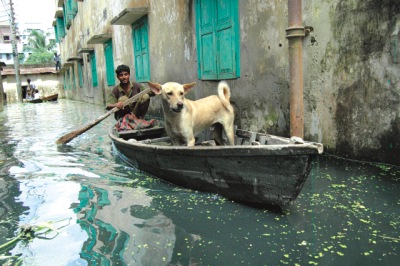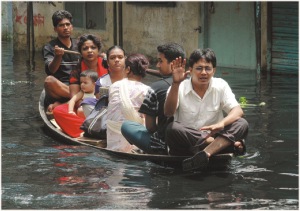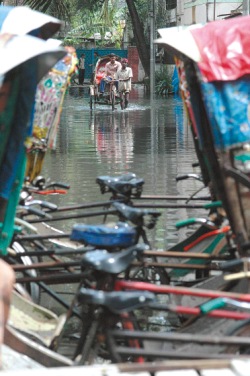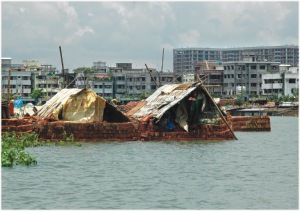ways to
confront the flood
situation
 Getting
safe water
Getting
safe water
Everywhere the eyes turn, all they see is water, and yet none of it
is drinkable. During a flood this is the worst suffering there is.
According to Zahurul Alam, executive engineer of System Operation
and Control Division (SOC), WASA, "In the capital, among all
the inundated areas Rampura, Bashabo, Goran, Khilgaon, Nondipara and
Demra are the worst hit. Sewer lines, drainage and water supply systems
have entirely collapsed." 44 pump centres in the city are currently
under water. People living in the shelters and those who have still
not left their houses are living in hazardous conditions. WASA is
distributing free water amongst the flood-affected people twice a
day. Currently they are running the project with 15 trolleys, 9 boats
full of jerry cans and some Gazi plastic tanks. This distribution
is being carried out in all the worst hit areas. All the 6 zonal offices
and SOC office is also distributing free water. The phone number of
zone 1 is 9356957, for zone 2, 7315249, zone 3, 8120205, zone 4,9003842,
zone 5, 9899340 and for zone 6, 9358615. You can also call the System
Operation and Control office, situated at Kakrail paanir tank compound.
Their number is 9358615.
Keeping
the water safe
In the places where there is less water or the water is about to rise
immediately, attach a thick plastic hose or metal pipes to the tap.
In the case of plastic hose you can take it inside the house. If you
attach metal pipes, make them long enough so that they stay above
the water level. Build barriers with cement and bricks to prevent
water from entering the reserve tank. Seal the tank if necessary.
During flood this process is not enough. Those who live outside the
affected area should take precaution too as contaminated water may
be supplied. Use bleaching powder or chlorine to decontaminate the
water in the reservoir.
Defeating
Diarrhoea
 According to the ICDDR'
B hospital source, till the filing of this story, around 515 new diarrhoea
patients are being admitted daily to their hospital. The disease is
spreading fast. The best way to defeat the disease is to drink safe
water. If there is a case of diarrhoea nothing beats the oral saline.
However ICDDR'B sources tell us that even after all the media hype
about home-made oral saline, many people still do not know its proper
use, specially in the rural areas. In the case of infants, some people
harbour the misconception that if the mother drinks oral saline it
will work on the baby. Also oral saline should not be used after 12
hours. Also, never boil the saline thinking that it will be usable
after that. Rural people regularly miss these essentials. During the
flood and any other time, always keep food covered. Lots of liquids
help in case of diarrhoea. Continue drinking saline till the loose
motion ceases. If the case is serious, transfer the patient to a hospital.
According to the ICDDR'
B hospital source, till the filing of this story, around 515 new diarrhoea
patients are being admitted daily to their hospital. The disease is
spreading fast. The best way to defeat the disease is to drink safe
water. If there is a case of diarrhoea nothing beats the oral saline.
However ICDDR'B sources tell us that even after all the media hype
about home-made oral saline, many people still do not know its proper
use, specially in the rural areas. In the case of infants, some people
harbour the misconception that if the mother drinks oral saline it
will work on the baby. Also oral saline should not be used after 12
hours. Also, never boil the saline thinking that it will be usable
after that. Rural people regularly miss these essentials. During the
flood and any other time, always keep food covered. Lots of liquids
help in case of diarrhoea. Continue drinking saline till the loose
motion ceases. If the case is serious, transfer the patient to a hospital.
Keep
medicines handy
Not just diarrhoea, floods bring about a lot of other ailments. To
prevent them, always keep some medicine handy. Emotil, Metronidazol
for loose motion, Paracetamol, Napa, and Ace for minor fever and Inflam
for pain relief. Inflam should be taken after meals and Antacid if
the person has acidity problem. You medicine box should contain a
few strips of band-aid, Savlon or Dettol for minor cuts, and lots
of Orsaline. For minor skin problems keep a bottle of Eskaboil handy.
Foods
that should not be salvaged
In the worst-hit areas the supply of food is very scarce. Many people
try to salvage food that went under water. During flood it is advised
that food should not be salvaged unless it is in a container that
protects it, or it can be thoroughly sterilized. Cereals, fresh fruits
and vegetables, meat, poultry and fish are foods that should not be
salvaged.
 Extra
care for pregnant mothers
Extra
care for pregnant mothers
Pregnant mothers are more vulnerable than any one else. They require
extra attention. Surfaces around the house become slippery during
the flood. Make sure the mothers do not fall. If possible, move them
to a relative's house. If the mother is in her advanced stage, immediately
move her to a hospital where she will get proper care.
Look
after your kids
Children might take a different perspective of flood. They might think
of this as some sort of ideal adventure. With everything that is going
on all around it is easy to lose track of the little devils. Just
a minute's inattention can lead to a major disaster and a lifetime
of regret. So no matter how hard life might be during the flood, keep
an extra eye on your precious angels so that they do not slip in the
water. Even a little contact with the filthy water can cause severe
illness. At the entrance make a fence that reaches above the head
of your child. Wood or bamboo, whatever you use to make the fence,
place them vertically so that the kids cannot climb up.
Watch
out for electric wires
This year's deluge is just a reminder of past experiences. Disconnected
electric wires killed several people during the flood of 1998. At
home electric wires should be checked during the water rise. If there
are any faulty wires they should be repaired immediately. Do not allow
power cord connections to become wet or to lie under water. Disconnect
any electric appliance if the house is submerged. Turn off the main
switch if necessary. Refrain from touching any wires loose or connected
when you are in the water or when your hands are wet. When you are
outside the house watch out for more disconnected wires. If there
is any put a sign so that others know and inform the DESA authority
as soon as possible.
Beware
of creepers and crawlers
Like humans, crawlers will search for dry land as well. Snakes, insects,
and other creepers usually find shelter in our homes. Living with
snake is dangerous and therefore precautions should be taken. During
the night do not move without a flashlight. Keep bottles of Carbolic
acid with the cap open inside the house to prevent snakes from entering.
It is available in any store that sells spirit or acid.
 Robbers
are on the loose
Robbers
are on the loose
There have been reports of robbery in the residential areas by people
posing as toll collectors for flood-affected people. This has happened
in mass scale in 1998. Do not suspect everyone who asks for a toll
but remain extra cautious. Do not leave the main gate open not even
for a minute. Don't let anyone in unless you can make sure of his
or her identity. Guards should be on alert round the clock.
Fake relief workers
There are always some people who try to benefit from other people's
misery. Many people have started taking tolls from houses and vehicles.
Not all of them will use the money for flood-affected people. Some
of them will put it in their own pocket. Keep in mind that the Dhaka
Metropolitan Police banned this type of toll collection since July
30th. If you do want to help, select a group that is already involved
in the relief process, check their credentials and then offer help.
Those who are seriously involved in the relief process are suffering
because of this announcement. They should change their policy. Instead
of money they should ask for dry food and medicine.
Outrageous
it is…
We saw the heartbreaking photo in the cover page of the Daily Star
on 29 July. An elderly woman with a blank look in her eyes, holding
a sack full of inedible rice and potatoes. She could not believe that
someone could do such a thing to her. This act was simply inhumane.
Whoever is responsible for this act should be severely punished. Also
a segment of DU student involved in the relief process complained
that they have received expired medicine from a renowned drugstore
of the city. A message to those who laugh at other people's misery:
please stop this type of heinous acts.
By Shahnaz Parveen
Photo: Syed Zakir Hossain
Treating
contaminated water
Zahurul Alam of System Operation and Control Division (SOC) also tells
us, "There are already lots of leaks in the lines and sewer elements
are getting in through those leaks". In emergencies, or as a
temporary measure, water from contaminated sources can be disinfected
by the following methods:
First of all try to secure safe drinking water from an approved or
emergency source if possible like the WASA. If this is not possible,
treat all water before drinking. If the tap water is not clear, it
should not be used without treatment. Allow the water to stand in
a container until the sediment settles and pour off the clear water
into a clean vessel.
Liquid chlorine helps clean water. Just add six drops of liquid chlorine
to one gallon of water and mix. Wait thirty minutes after adding the
chlorine before using the water for drinking or cooking purposes.
Chlorine is available in most drug stores.
The water can also be purified by boiling. Bring the water to a full
boil for at least five minutes. During flood, however, it is sometimes
hard to find dry fuel or even a dry place. So using water purifying
tablets such as Halotab are the best solution. Use one tablet per
litre of water. Use after 30 minutes. Halotab is available in any
drug store.
One of the above treatments should be continued until the quality
of water can be secured. Remember that the safety of water cannot
be judged by colour, odour, or taste. The organisms that cause water-borne
diseases cannot be seen.
Vigilance
about the criminally insane…
Once again, our memory takes us back to the flood of 1998. Back then
different newspapers reported cases of sexual molestation of girls
coming to flood shelters. This time let us be more vigilant and make
sure that it is not repeated. Tabassum Ara Rina, program manager of
Nari Moitree who has been working on adolescent girls told us "This
year there haven't been any such reports yet. Remembering the incidents
of 98 we are being very watchful." Nari Moitree is currently
working in the shelters of Dhalpur, Meradia, Goran, Madartek, and
Rajarbag. For girls they have managed separate corners. Plain-clothes
policemen are guarding the shelters. They have established community
watch groups to prevent any incident of sexual harassment. During
the night it is being made sure that some one accompanies the girls
if they go to answer the nature's call. More activities like these
are needed to protect women especially adolescents.
Efforts
to help the flood affected people
Flood-relief projects are going on with the help of many groups, although
these efforts are still insufficient. We visited DU campus to see
the activities there. Young people are working really hard to help
the affected people. These people are going door to door asking for
donations. In the cafeteria of IER we met some of them. Bonnyarta
Shahojogita Kendro, a formation of four small groups namely Shuchana
Adhyan Chakra, Deasholai, Progotir Paribrajak Dal, and Bangladesh
Chhatra Federation. Many general students from different dormitories
go there everyday to make roti and saline for distribution. Everyday
they visit the affected areas in groups to distribute food, medicine
and clothes. Abul Hasan Rubel, one of workers of the platform told
us "If anyone wishes to help us, we will accept it. Money, food,
and even with manual labour to prepare the food or distribute them
will be appreciated." So if any one reading this story wishes
help just go to the IER café situated beside the resister building
of DU.
The Bangladesh Chhatra Union and Bangladesh Chhatra Front are working
in the TSC of DU. In the gymnasium of DU, BCU is preparing saline.
In the Fine Arts, students are selling paintings to raise money for
the affected people. As we have mentioned before there are some people
who are collecting money for their own benefit. These are the groups
who are really working for the benefit of the flood-affected people.
Different dormitories and departments of DU are also working for the
cause. If you have plans to help then just visit the DU campus. Every
little effort counts in a crisis situation like this.

